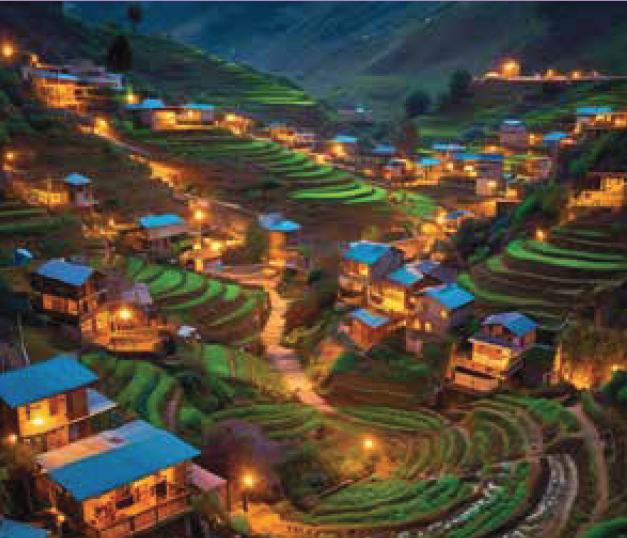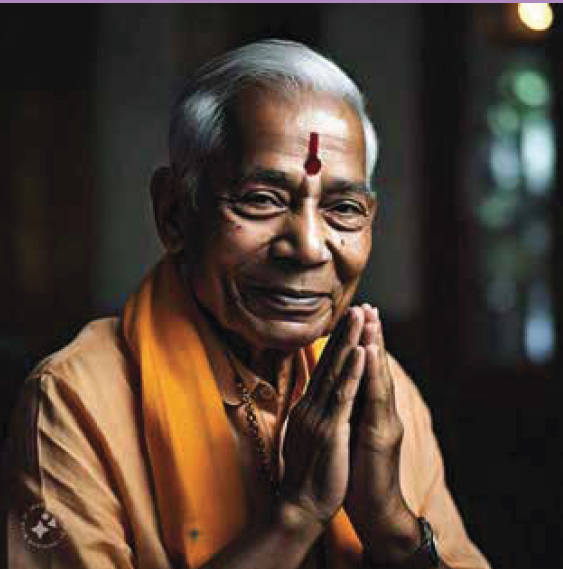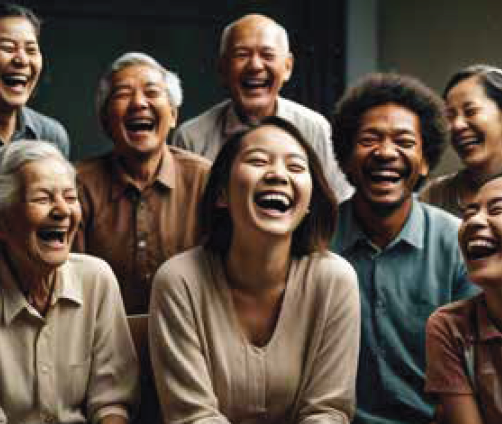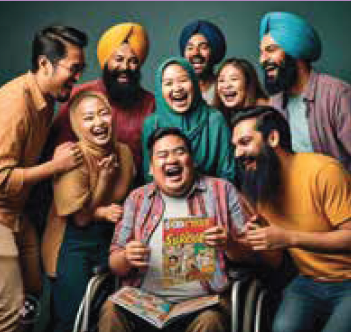We have been made to believe that we need to be slim to be considered “healthy”. When we start an exercise routine, the results are measured based on numbers that appear on a scale, whether our clothes fit better, and when someone says “Hey! You’ve lost weight!”.
However, we are not defined by numbers on a scale or the size label on our clothes. In Ayurveda, we are seen as physical beings that are powered by Prana – the lifeforce of the Universe. Whatever is created by the Universe, is reflected and manifested in our body, mind, senses, and actions.

Ayurveda teaches us how to live a life that is filled with positive energy, presence, love, respect for nature, giving back to the community, and gratitude. This 5,000 year old system of medicine focuses on preventive care first before looking into treatment. It teaches us that we have the power to make mindful choices that can either keep us healthy and vibrant, or be susceptible to early onset disease.
To be perfectly honest, we are all susceptible to illness, disease, decay and death. It is the way of Nature. We are governed by Creation, Preservation and Destruction; the 3 laws and forces of Nature. How long we live, how well we live, is entirely in our hands and in the hands of those who care for us and vice versa. This comes down to learning about what foods are suitable for our body types based on our lifestyles, pace of life, country, and how well we sleep.
The 3 Pillars of Health in Ayurveda are Food, Sleep and Lifestyle. Food is something we need to give us energy to perform our roles in life with vigor and enthusiasm. Sleep is essential to rest our mind and body to prevent us from falling sick. Lifestyle allows us to choose how we want to participate in society, stay active, creative and curious. Any imbalance in these 3 pillars will result in us having digestive issues, low energy and bad sleep.
Here are some humble tips that can help us live a life that is simple, vibrant and joyful: Start your day with warm water on an empty stomach to wake up your digestive fire, stretch your body for 10 minutes, go for a 10 minute walk under the morning sun, take lukewarm showers, enjoy simple meals that are freshly cooked with local vegetables, meet your friends regularly to socialize, do your work with gratitude, spend a few minutes in silent prayer or meditation, let lunch be your biggest meal of the day, and keep things simple.
About the Author
Parnella is an Ayurveda Therapist, Trainer and Yoga Educator at Union Yoga Ayur veda. She provides therapeutic services to patients from all walks of life and facilitates Ayurveda and Yoga Therapy Foundation classes to sincere and curious students. She truly believes that Ayurveda and Yoga are for everyone. Whatever your species, race, age, occupation – there is something for everyone because these sciences are gifts to us from the Universe. It is through sincere studying, curiosity and unwavering faith that we can live a life that is present, mindful and joyful no matter the circumstance.
My old friend David and I have known each other since 1975, and met on a kibbutz by the Sea of Galilee when we worked as volunteers. Both now married and somewhat decrepit with grown-up kids, we have often escaped domestic life over the years to roam the mountains and valleys of Himachal Pradesh together, an area of India we both know and love.
Our latest sojourn was in April this year. We rendezvoused at Delhi domestic airport (he now lives in Australia, and I in Singapore) where a turboprop flight took us to Bhuntar. We then took a taxi to Tosh at the upper end of Parvati valley, driving through Kasol and Manikaram as we ascended to 10,000 feet. Our guesthouse boasted an uninterrupted view of the snow-capped ranges across the valley, almost unreal in their transcendental beauty.
We used this as a base for a week to acclimatise, hiking the valley past pristine waterfalls in the cedar forests, and further up into the snow line where only Gurjar shepherds and the occasional lone bear or leopard dared venture. The town of Tosh itself has sprung up over old terraced fields where vegetables and fruits once thrived. The local population has largely succumbed to tourism during the past thirty years, with Tosh becoming a refuge for young Israelis escaping the stresses of home, the bass notes of trance music reverberating across the valleys deep into the night.

We took several hikes to the snow line but our advancing age soon took its toll. Gone were the days of scrambling over 16,000 ft passes in blizzards, and camping on cold hard rock. We congratulated ourselves on making the decision to take day hikes from a central base, to which you could return in the evening to a hot bath and a rejuvenating meal of dal, chapatti, rice and sabzi, the hiker’s standard fare. By 9 pm the cold set in and we would retreat to the cocoons of our cosy sleeping bags.
We met several interesting foreigners living in those foothills, escapees from the western world. But we decided that the Parvati valley no longer held the same mystique as it had a generation before, so we moved on to Chamba by bus, and after a comfortable night in the only good hotel in town, took a jeep to Tissa at the head of the valley. We found a friendly guest house with an excellent cook, and made our base there for ten days, hiking high up the valley slopes on both sides.
The lower slopes are intricately terraced, and farmers grew fruit and vegetables in the fecund black earth. The area is known for its apple orchards where several international strains are cultivated. We met an amiable horticulturalist who outlined the production process in detail, and who then invited us home for lunch.
This generosity is typical of the people in this area. A group of young men whom we first took for scallywags followed us for a while then shyly introduced themselves. They were all undergraduates at an agricultural university, home for a long weekend, and spoke fluent English. (David speaks appalling Hindi, and I, none at all). What was so refreshing about them was their obvious love of the countryside and rural tradition in that part of HP. They vowed to return to cultivate the land after graduation and to continue and improve the sustainable farming methods used by their forefathers. However, one of them had a different ambition; to join the police force. Apparently, this part of HP has a very low crime rate and it would be an easy job!
Tissa is well away from the tourist routes. We encountered no foreigners during the entire time we were there and the locals were open and generous. Indian tourists from the plains generally only venture as far as the large town of Chamba to witness the local festivals. Tissa area, a secret paradise, is a step too far for most. The access road is a nightmare, with dangerous landslides, strewn with crushed cars and trucks.
Logging in the Tissa area appears to be under control, and we hiked high through dense cedar and pine forests and higher into the snow. Though exhausting at times, the effort was always amply rewarded when we would find a place to sit in cool shade and look across the valleys toward the majestic mountains beyond, all the way to Kashmir, and to marvel at God’s creation.
I am 70 years old, and I have never known a time when I have not been in love with God.
Blessed to be born into a God-loving and God-fearing family, I have, over time, grown to lose myself totally in God’s love with fear cast aside. My parents and my siblings somehow always treated me special thereby inspiring me to do good and to be aware of goodness.
To me, this special relationship with God came about as I believed I was my Mum’s favourite child amongst her eight children who she declared she loves all equally even now at 94. But I have always felt that secretly I am her pet and dared her to publicly deny it. And she did several times even at our last new year party as to her all of us eight children were equal claimants to her love. Yet I knew. Such
was my affair with God too despite the Gita declaring that God does not play favourites and that we are only punished by our own actions. Yet there is something more.
So life, to me, was a joy parade, filled later by my wife, daughter and son and my stream of godsons, nieces and nephews, and great best friends too. Of course, there were some strict parade wardens and water bombers along the way but they sharpened the joy.
Feeling the Love
Walking in the Grace of God and knowing that God just loves me has been one of the most fun parts of my life. I do not know how I learnt or how I knew the secret of God’s love but it has always been my strength and source of joy in life. I have had people marvel at my easy life or even put me down saying you act like as though you are the only one God loves. To me God’s love is expansive and just not static. There is goodness all around the world and enough for everyone. God’s love is just unlimited and so so real.
When young, I was so dependent on God for everything that I used to envy free thinkers and atheists feeling that they were so strong to be able to live on their own without wanting or needing God. But as I grew up and saw the amazing things happening around me, I felt instinctively so loved and so well looked after. In my later days as I started reading the scriptures, I began to understand that this was the reality of life when a concept of something you cannot see becomes so powerful within you that you start to experience and actually feel His presence, love, care and support within you as a reality.
The Connection
I understand the exclusivity of Christianity and Islam of an exclusive God. I do not see as belittling the other religions – the approach to God as the establishment of the one and only way to Him. The reality is that if one does not believe in God, He really cannot reach out to you to give you that Peace of Mind. How can you experience Christ’s Love if you do not believe in him? You must have faith in God whether you call Him/Her Allah, Shiva, Ram, or Buddha or Christ.
Just Be Ready
So, this is my simple message: to let God help you, you must whole-heartedly admit him into your personal life and accept him as a reality in your life. No need for big or small sacrifices or severe penance. He is not looking for perfection. Just the simplicity of heart that wants to be loved and is ready to be so loved. Just plug into the wonder to see his Glory in everything surrounding you. Again, my mother is the perfect example of such positivity: she has the sweetness of heart to forgive even the people who hurt her without bitterness. She saw good in everyone and everything everywhere without judging anyone. So being close to her, I picked up some of these tips which many saw as a weakness or being so desperate to be loved. But to me, it was the easiest route in life to see the love that
everyone has for you. The more you believe the more it happens. Hence, they say: “Blessed are you to see God in everything that happens to you. You need ask for nothing.”
Happiness is just yours – all yours for the taking. And unashamedly just celebrate the joy of being happy for yourself as well for others (more for the latter the better). As Sadhguru says, if you have not wet your face with tears of joy, you have never lived well (paraphrased).

The Reality Check
Do not go away thinking I have led a very quiet and sheltered life. With Shiva in my life, I have faced many battles too: being harassed at a five-star hotel in London; robbed in Central Park in New York; nicked in Belgrade in the 80s; or even abused by the police in Buenos Aires or having mobiles pinched in several cities, even a laptop stolen in Colombo; or drugged in Bangkok; abused by bad people several times; and having my share of holiday disasters and mountain/lake accidents and losing several beloved friends and family including my Father too. But even in the darkest despair, my knee jerk response was just: “Om Namashivaya” and I always found my way home with my smiles and faith intact, ready for the next challenge. There still are some people who fear being near me, thinking I am a calamity Joe with all these freakish accidents striking me.
In my career, be i t as a diplomat or journalist or businessman, when things seemed just beyond me, the Universe has stepped in to shape things up for me. As I look back, I can say with certainty that there are so many things I never could have consciously done and yet I have done them by that unseen hand of God making things fall into place. All I did was to make sure my team and I put in our very best efforts. The rest was just divine help that comes pouring in.
I enjoy the oneness of God everywhere even in the holiest of sites be it, Temple Mount in Jerusalem, Jeddah (I could not go Mecca being non-Muslim), St Peter’s Basilica in the Vatican or Kailash in Tibet, Kasi or Rameshwaram in India or just in the smiles of people walking on the streets on workdays.

So convinced am I by God’s very presence in my life, that I often warn my enemies or those seeking to harm me, that though I can take it, Shiva will not be able to accept this and will come to punish them. In my time I have seen them getting their come-uppance, not that I ever pray for revenge.
I have joyfully seen some of my joy rub off on my mates too. There were many times when my mates paid good money to bribe me to pray for them or ask my Mum to make special offerings in their names at the temple though Hindus they were not. But joy is infectious. It passes on.

A Good Life
As for me, Life is just too good not to enjoy walking in the strength of loving God and knowing that God loves you. Being a Hindu with the unmanifested God represented in numerous forms to suit your preferences, I adore every faith and embrace every belief with joy. Surely goodness will follow you everywhere with God beside you, making where you are the happiest place ever. I am 70, not a wide-eyed child. But the love of God makes me a child forever. God’s child forever.
About the author
Lifelong Hindu, he enjoyed dabbling in law, diplomacy, journalism and publishing which all brought him back to Sanskrit, religion, Shiva and Ram and the need to see God in everyone. Still trying.
Mark Twain, American writer, once famously remarked, “Laughter is the Greatest Weapon We Have and We, As Humans, Use It the Least.” This notion resonates deeply with many, suggesting that laughter possesses a transformative power often overlooked in our daily lives.
Most people enjoy a laugh now and then and some have suggested that laughter is the best medicine. On many occasions, doctors would ask the family to always keep the patient happy so that they would recover quickly. The mind and body are wired; a healthy mind promotes a healthy body.
Laughter is sometimes seen as contagious as one person’s laughter can trigger this emotion in others to create a human-to-human connection. It is not just limited to communicating humour, but it also facilitates bonding across large groups of people in a community.
Having said this, at times, it is essential to acknowledge that laughter, while typically a force for good, can also wield negative repercussions, sometimes inadvertently causing discomfort or embarrassment within social settings.

Humour itself is also deeply embedded in cultural contexts, with each community having its own unique comic sensibilities. They may have their own jokes which may not be understood by others. It is therefore important to know the difference between laughing at oneself, laughing at others and laughing with others. Some people have achieved fame and fortune by making people laugh.
A Greek philosopher, Aristotle once rightfully said, “Laughter is a Bodily Exercise, Precious to Health.” Its effects on both mind and body are manifold, serving as a catalyst for positive change. With so much power to heal and renew, the ability to laugh easily and frequently is a tremendous resource for overcoming problems, enhancing relationships, and supporting both physical and emotional health.
So, what are the physical, mental, and social benefits of laughter?
- It draws people together in ways that trigger healthy
physical and emotional changes in the body. - Laughter strengthens the immune system, boost moods,
diminises pain and protects one from the damaging
effects of stress. - Nothing works better or faster than to bring the mind and
body back into balance than a good laugh. - Humour lightens the burdens, inspires hope, connects one
to others, and keeps them grounded, focused and alert. - It releases anger and foster the ability to forgive sooner
this strengthening relationships, bonding, teamworking,
while defusing conflict.

In a world often fraught with adversity and strife, laughter emerges as a vital coping mechanism. It offers a reprieve from life’s hardships, reminding us of the resilience of the human spirit. Embracing laughter is not merely a luxury but a necessity—a means of navigating the complexities of existence with grace and humour. As we navigate the intricacies of daily life, let us not underestimate the power of laughter. In seeking moments of frivolity and joy, we cultivate a mindset of resilience and gratitude, enriching our lives and those around us in profound ways.
The clock ticks past 2 a.m. The city sleeps, but in one home, the quiet is broken by a wracking cough. Madam Lim gently holds her husband, his frail body struggling for breath. It’s a scene playing out in countless households across Singapore, where a rapidly aging population faces the realities of life-limiting illnesses.
“I’m failing him,” Madam Lim whispers, her own tears mingling with his. It’s a feeling of desperate loneliness, shared by many caregivers who navigate the complexities of end-of-life care alone.
The Challenge of Caregiving in a Cosmopolitan City
Singapore boasts world-class medical facilities, yet a critical gap exists in supporting patients and their caregivers outside of hospital walls. Research shows 95% of a patient’s journey happens at home, where emotional, spiritual, and social well-being (psychosocial support) become paramount.
A recent study revealed that over half of caregivers feel stressed “all the time,” and many report mental health struggles. Without community-based care, they face immense challenges:
• Inadequate Care: Managing pain, anxiety, and emotional needs at home is overwhelming without proper guidance.
• Isolation for All: Patients, caregivers, and even family members suffer from loneliness and fear.
[Mental Health Study of Caregivers: Source: Caregivers Alliance Limited and Milieu, 2022 with 1000 sample size]
A Compassionate Solution
Kampong Palliative Care empowers caregivers and builds community readiness with a two-pronged approach:
1. Virtual Engagement: Provides bite-sized learning resources, a supportive online community, and access to expert advice, ensuring that no one feels alone on this journey.
2. Face-to-Face Engagement: Offers culturally sensitive training, legacy cafes for sharing experiences, and outreach to raise awareness about end-of-life care.
Ripples of Support
Kampong Palliative Care benefits not only caregivers but also:
• Individuals facing Life-Limiting Illnesses: Empowering them to participate in their own care and find comfort in their final journey.
• Kampong Dwellers (e.g., neighbours, colleagues, friends, extended family members etc): Equipping them to offer compassionate support and build a more connected community.
A Conversation That Matters Imagine Madam Lim sharing her struggles with her neighbour, Mrs. Ravi, who’s been trained in Kampong Palliative Care. Mrs. Ravi doesn’t just offer condolences; she actively listens, validates Madam Lim’s feelings, and connects her to vital resources. This is the power of a prepared community.


Transforming Lives
Kampong Palliative Care will redefine end-of-life experiences in Singapore. By addressing the often-overlooked psychosocial needs and fostering a culture of compassionate preparedness, we ensure that no one faces this journey alone. Empowered caregivers. Reduced isolation. Stronger communities. This is the future of care in Singapore.
This article is written by Dr. Swapna Dayanandan (PhD, Gerontology) Consortium Founder (Kampong Palliative Care), in partnership with the Singapore University of Social Sciences and supported by Ngee Ann Kongsi.
Tenzin Gyatso, His Holiness, the Fourteenth Dalai lama of Tibet was born on July 6th, 1935, in a small farming village of Taktser in the province of Amdo, Northeast Tibet. It is true that he sincerely believes that there is nothing extraordinary about him but the world at large or at least a significant part of it thinks otherwise.
The Dalai Lama is no ordinary monk. Ordinary monks do not get recognised as the world’s conscience keeper, neither do they win Nobel Prizes. The Dalai Lama the most human of human beings, is a touch of divine grace that has inspired people from all walks of life across the world to fall at his feet in abject reverence, and yet he is the very epitome of humility. At the tender age of two, he was chosen as the reincarnation of his predecessor, the thirteenth Dalai Lama. He was formally installed as the head of state of Tibet on February 22, 1940.
When communist China invaded Tibet in 1949, despite the tireless efforts of the Dalai Lama to bring about a peaceful resolution, the Chinese responded violently, destroying the very essence of Tibetan culture and spiritual heritage. They continued their atrocities, creating disillusionment and resentment amongst the Tibetans who responded by staging armed uprisings in Lhasa on March 10th, 1959. His Holiness had to flee the country and on March 17th, 1959, he crossed safely into India where he was warmly received and given asylum.
In his plight to save his people and the Tibetan culture, the Dalai Lama began a peaceful struggle to preserve Tibet’s unique identity and regain the country’s independence. For his efforts, he was awarded the Nobel Peace Prize in December 1989. The Nobel committee said that “The Dalai Lama, in his struggle for the liberation of Tibet, consistently opposes the use of violence. He has instead advocated peaceful solutions based upon tolerance and mutual respect in order to preserve the historical and cultural heritage of his people.”
Dharamshala
McLeod Ganj, in Dharamshala, the official residence of His Holiness, is named after the Lieutenant Governor of Punjab, David McLeod and Forsyth Ganj, the Divisional Commissioner. It is situated in the northern Indian state of Himachal Pradesh. The mountains dominate the scenery of McLeod Ganj which is nine kilometres by bus and four kilometres by taxi uphill from Kotwali Bazzar. While inhabitants of lower Dharamshala are almost all Indians, McLeod Ganj is primarily a Tibetan area. It is surrounded by pine, Himalayan oak, rhododendron, and deodar forests.
My Journey
Up upon the mountains of Dharamshala I braced hairpin bends and winding narrow roads with breath-taking snow cap ranges to receive the blessing of His Holiness. When I arrived in Dharamshala with my uncle from the Indian Diplomatic Service and his family, I was told that my audience, which was arranged months earlier, with Tenzin Geyche the former PA of His Holiness and former prime minister of the Tibetan Government in Exile, was cancelled. They said His Holiness was under the weather. I said “No, His Holiness will see me.” I was ill and I felt like the lady from Samaria in the Bible, I knew, like her, as she said about Jesus “If I could touch his robe I would heal.”
Within five minutes, His Holiness gave word that he would see me. My uncle told me it was his diplomatic connections; but I insisted it was my strong faith. His Holiness heard my inner call and plea from my heart for help and he came to me, and I was the only one at the audience that got a ‘Medicine Buddha’ from the divine hands of His Holiness. I went with joy as it was a telepathic connection between His Holiness and myself. His Holiness is my guru and in my deepest of sorrows and darkest hours I still can connect with him from Singapore. His protective hand is always on me and with it, I surmount hurdles and challenges, and his compassion protects me from dangers. I cry whenever I connect with His Holiness – it is an awesome divine experience.
That I was blessed was no other than the will of the Almighty. My heart beat faster in excitement as I looked on the kindly face of His Holiness who gently took hold of my hand and gave me a Buddha. The experience was awesome and blissful. A strange sense of calmness and peace enveloped me as I reached out to receive the divine grace of His Holiness. I will cherish this day, 16th April 2006 till my dying day as I know I touched the hand of a living god.
For many of us, the advent of COVID-19, has brought about fear. The fear of contracting the virus, the fear of losing our livelihood, the fear of not being able to travel overseas to attend an emergency.
Is COVID-19 the cause of this fear mongering within us? Think deeply and we may come to realize that COVID-19 is just a trigger. In the past we may have encountered other instances when we suffered much anxiety.
So to overcome COVID-19 or any such triggers, we need to be able to manage this emotion called fear. Revered Sree Narayana Guru has explained the ‘why’ we fear and how to overcome this fear in the Daivadasakam. I shall focus on verses 1,3,5 and 10
|
Verse 1 ദൈവമേ!കാത്തുകൊള്കങ്ങു കൈവിടാതിങ്ങുഞങ്ങളേ; നാവികന്നീഭവാബ്ധിക്കോ- രാവിവന്തോണിനിന്പദം. |
Meaning From the most high, O Divine, protect us here, do not leave us. You are the navigator of this ocean of ephemeral becoming, and (to us) your name is a mighty steamship. |
In verse 1, Man is imploring the Lord or Supreme Power to help him overcome obstacles/dangers in this ocean of life. The word “Bhavabdhi’ refers to the Ocean of life. It implies the Fear in Man as he navigates his life’s journey in an environment of change. The Ocean’s surface is continuously in a state of flux. We are afraid of the strong waves we encounter on the surface and even more afraid of what lurks beneath, the unknown. We are certain that we need a mighty steamship to manoeuvre this Ocean of life and we implore the Lord to be the navigator/pilot/captain of this vessel and we dedicate this Steamship to the Lord.
|
Verse 3 അന്നവസ്ത്രാദിമുട്ടാതെ തന്നുരക്ഷിച്ചുഞങ്ങളെ ധന്യരാക്കുന്നനീയൊന്നു- തന്നെഞങ്ങള്ക്കുതമ്പുരാന്. |
Meaning Ever having given us food and clothes And providing for all such needs, Making us rejoice in our contentment, You are our only Lord. |
In Verse 3, we acknowledge that the food that we partake and the clothes that we adorn are the offerings of Nature. Man is unable to create anything out of nothing. He can, however, employ the gifts of nature to feed and clothe himself. However, he must put in effort to utilise the offerings of nature to provide for himself. The compassionate Guru advises contentment. Contentment is only possible if we share the benefits, that accrue from our efforts, with others. Implicit in this is that we must respect Nature and share this planet with all other creatures. If we are willing to strive to provide for society, if we have a mindset of sharing and caring, then we can be assured that Nature will make available the necessary tools for a comfortable life. We will never fear circumstances that may take away the wealth, position, or the status we have acquired. Revered Sree Narayana Guru has emphasized in his teachings that Man has let greed overcome him. Man is not contended with securing land for his use but has also exploited what is below the ground. In the process he has displaced the other creatures on this planet and altered the balance of the Environment. Conservationist have attributed the emergence of viruses like COVID-19 to humans displacing animals from their natural habitats which has caused these animals to come into closer contact with humans. Trafficking exotic animals for financial gain has also contributed to these zoonotic diseases. If Man respects nature, we will not need to fear such pandemics.
|
Verse 5 നീയല്ലോസൃഷ്ടിയുംസൃഷ്ടാ- വായതുംസൃഷ്ടിജാലവും നീയല്ലോദൈവമേ,സൃഷ്ടി- യ്ക്കുള്ളസാമഗ്രിയായതും |
Meaning You are the creation, the creator too, As also the myriads of created things. You again, O God, are the Substance Of which all creation is made. |
In Verse 1, we have noted that Man has a Fear of the Unknown. But if there is no unknowns, then this fear should dissipate. In Verse 5, Revered Sree Narayan Guru states that the Lord who we saw as a Power apart from us is actually the substance of Creation, which implies that each and every one is an embodiment of the Supreme and so are the Plant and animal kingdoms as well as all non-living things. So if the Lord is present in all, why do we need to Fear the unknown?
|
Verse 10 ആഴമേറുംനിന്മഹസ്സാ- മാഴിയില്ഞങ്ങളാകവേ ആഴണംവാഴണംനിത്യം വാഴണംവാഴണംസുഖം. |
Meaning In the deep ocean of your Glory Let us all become immersed, There to dwell, dwell forever, In Felicity Supreme! |
The concluding verse 10 reveals the Truth of our Being. The Ocean of Change that Man feared in the First Stanza is the Very Source of Calmness, which you will only realize when you go to the depths. Similarly, when Man looks deep inside himself, he realizes his True Nature and then there is no more fear when he realizes the Oneness in everything. So never Fear.
I understand that Sree Narayan Guru composed the Daiva Dasakam at the request of an educator who wanted children, regardless of faith, to chant an universal prayer. The composition flowed from the lips of the Guru. In ten verses he provided the tools for a seeker to be transformed from an ignorant to a knower. Only a Realized Master with compassion can deliver this masterpiece. Our Salutations to the Guru.
Jayadev Unnithan
What is Gerontology?
Gerontology is both a field of study as well as a professional specialisation. The word “gerontology” has its origins from the Greek word “Gero” meaning old man, and “ology” which mean “the study of”. Therefore, the term Gerontology refers to the study of the ageing process and older populations. The vast variety of disciplines that may be involved in the study of ageing populations range from sociology, psychology, economics, social work, medicine, pharmacology, psychiatry, nursing, anthropology, architecture, history, geography, philosophy and even dentistry. Since ageing is a multidimensional process the study of ageing has to be multidisciplinary.
Emergence of Gerontology
The emergence of gerontology took place just after the mid-twentieth century, when issues related to health, retirement, long-term care, and poverty grabbed the attention of academics, politicians and service providers. The historical origins of gerontology took place in the United States and United Kingdom. In 1985, Bergener stated “Gerontology is still a very young science – a science on the way to developing its own logic of research – taking into account the complexity of the subject to be examined.” Between 1960 and 1999, a huge amount of literature was published, lifting the entire discipline to a respectable level of scientific enquiry. Simultaneously, international and national organisations were formed, such as the International Association of Gerontology and Geriatrics and International Federation of Aging; British Society of Gerontology, Canadian Geriatrics Society, Gerontological Society of America, Japan Gerontological Society, Gerontological Society of Malaysia, amongst many others.
Sub-Disciplines in Gerontology
Meanwhile, the field of gerontology started to sprout sub-disciplines such as social gerontology, medical gerontology, feminist gerontology, geropsychiatry, ethnogerontology, psychogerontology and gerontopharmacology. Today each of these disciplines has accumulated a pool of literature that is growing dramatically to keep up with the current global ageing process. The impetus for the rapid growth of gerontology is directly linked with the phenomenon of global ageing. Today, counties that have more than 7% of their population belonging to an age group above 65 years old are identified as ageing nations. Singapore joined the league of such nations at the turn of the last century.
Gerontology as a Profession
Why is the development of gerontology as a field of study and a professional specialisation so crucial to an ageing society? In other disciplines, it is easier to be updated as the literature would be concentrated in some specific journals or types of books. But gerontology, being multi-disciplinary by its very nature, poses an immense challenge. The Master of Gerontology Degree offered at SIM University since 2011 fills the gap to some extent, in Singapore. Professors of gerontology have to regularly attend conference and seminars to stay abreast with the newest developments.
Studies in Gerontology and their Application.
Discoveries and technical advances become obsolete quickly as new findings replace the old with lightning speed (literally!). Practitioners such as social workers and counsellors have to upgrade their skills as new theories and concepts demand modification of practical skills and program designs. “In gerontology social scientists are faced with a wide variety of research problems ranging from the abstract (what are the effects of population ageing on present and future social structures) to the practical (what public policies can best reduce poverty among the aged?) while this quote is largely in reference to social aspects of gerontology, it is also applicable to other aspects of gerontology.
Research that is either pure or applied (or a combination of both) is relevant to gerontological studies, as long as the subject is to do with ageing, older persons and their families. An example would be the study of poverty among older people: what are the contributing factors? Are there policies that unintentionally promote poverty among the aged? Are older women more prone to slipping into poverty due to life course events and social structures? In what way to cultural factors, beliefs and norms play a part to sustain poverty among older women? What changes in policy are required to help this vulnerable group? In what ways can social interventions and programs assist the poor older women to overcome the obstacles?
Preparation for an ageing population necessitates the synchronisation of policies, services and programs as well as the reviewing of these to keep in tandem with changing cohort characteristics. Apart from this, new research has to be regularly conducted to provide statistics and insights for relevant policy planning and service provision.
Shaping Policies and Developing Services and Programmes
In the context of developing countries, it is often the case that target populations i.e older persons and their families, are unaware of services provided by governmental and non-governmental bodies. Public education has to be continually provided through various channels, such as radio, television newspapers (in relevant different languages) the internet and public talks so that the populace is kept informed of policies, services and changes (if any).
In Singapore, the Gerontological Society was formed in 1986 and since its inception it has been actively involved in public education, organising of conferences, and encouraging research in the field of ageing. Institutes or associations of gerontology have performed some of these functions in developed countries, and this has been of tremendous importance to increasing access to resources for the older population and their caregivers.
Changing Perceptions and Integrating the elders into Society
Negative stereotypes i.e., ageism exists in almost all societies, including Asian ones. It is invisible and sometimes indirect, escaping the eyes of the cursory observer – yet when we examine closely, with changing values of society, ageism creeps in. the positive strengths of older generations should be regularly reiterated, so that their past contributions are remembered, and their wisdom recognised. With more people trained in the artistic and scientific disciplines connected to gerontology, it is possible to remove to a great extent biased views and replace them with positive ones. Government ministries conduct skills training or upgrading courses, but these sometimes do not cater to the aptitude or capabilities of seniors. Gerontologists could be hired as consultants to design these courses so that the resources are not wasted, and older persons actually benefit from the courses.
Research into evaluation programs and courses is required, so that funding bodies may be informed of the usefulness of the activities concerned, as well as improvements required. Similarly, evaluation studies that monitor policies are also required for the same purposes. As knowledge and awareness of the physiology, psychology and social backgrounds of the participants is required as well as systematic tools of evaluation, gerontologists are well suited to conduct these evaluations.
Enhancing the lives of the Disabled
Geriatric and Gerontological experts should work hand-in-hand in the application of scientific advances, biotechnology and assistive devices to enhance the lives of the disabled. It is inevitable that an ageing population will add to the numbers of physically and mentally disabled. The naked truth is that the fourth age will bring to head such issues not only for the nation, but also for family members to deal with. Family and professional caregivers are faced with issues surrounding frailty, immobility, hopelessness, helplessness depression and suicidal intentions. Such stressful responsibilities do lead to physical and mental exhaustion of caregivers. Once again, in this arena, gerontologists and geriatric professionals can give their inputs into effective social and therapeutic interventions so that the needs of the caregivers are not neglected.
Enabling Caregivers
In the context of Asian societies, where the government expects families to provide primary and long term care, it is in its interest to care for the family caregivers hence assisting them to continue caring for elder relatives, lastly, the training of professional and family caregivers in issues and problems related to ageing is urgently needed, for instance managers of day care centres or shelter homes should be familiar with symptoms and indicators of diseases such as diabetes, medication and their side effects and crisis management interventions such as in cases of elder abuse or suicidal attempts.
The trainers themselves should have prior training in the field of gerontology. It is a challenge for trainers to adapt the knowledge gained from other developed counties to suit the local political, economic, and socio-cultural context. For such courses to be beneficial to the participants, models, concepts, and theoretical frameworks have to be relevant and suitable to the local population.
Society for all Ages
To sum up, it is to the advantage of all ageing nations to begin their preparations for a mature society, recognising the tremendous contribution of gerontologists towards the goal of a caring “Society for all Ages”.
What an extraordinary situation is that of is mortals! Each of us is here for a brief sojourn; for what purpose he knows not, though he sometimes thinks he feels it. Nut from the point of view of daily life, without going deeper, we exist for our fellow men – in the first place for those on whose smiles and welfare all our happiness depends, and next for all those unknown to us personally with those destinies we are bound up by the tie of sympathy. A hundred times every day I remind myself that my inner and outer life depends on the labours o other men, living and dead, and that I must exert myself in order to give in the same measure as I have received and am still receiving. I am strongly drawn to the simple life and am often oppressed by the feeling that I am engrossing an unnecessary amount of the labour of my fellow-men. I regard class differences as contrary to justice and, in the last resort, based on force. I also consider that plain living is good for everybody, both physically and mentally.
In human freedom in the philosophical sense I am definitely a disbeliever. Everybody acts not only under external compulsion but also in accordance with inner necessity. Schopenhauer’s saying, that “A man can do as he will, but not will as he will,” has been an inspiration to me since my youth up, and a continual consolation and unfailing wellspring of patience in the face of the hardships of my life, my own and others.’ This feeling mercifully mitigates the sense of responsibility which so easily becomes paralysing, and it prevents us from taking ourselves and other people too seriously; it conduces to a view of life in which humour, above all, had its due place.
To inquire after the meaning or object of one’s own existence or of creation generally has always seemed to be absurd from an objective point of view. And yet everybody has certain ideals which determine the direction of his endeavours and his judgements. In this sense I have never looked upon ease and happiness as ends in themselves – such an ethical basis I call more proper for a herd of swine. The ideals which have lighted me on my way and time after time given me new courage to face life cheerfully, have been Truth, Goodness, and Beauty. Without the sense of fellowship with men of like mind, of pre-occupation with the objective, the eternally unattainable in the field of art and scientific research, life would have seemed to me empty. The ordinary objects of human endeavour – property, outward success, luxury – have always seemed to me contemptible.
My passionate sense of social justice and social responsibility has always contrasted oddly with my pronounced freedom from the need for direct contract with other human beings and human communities. I gang my own gait and have never belonged to my country, my home, my friends or even my immediate family, with my whole heart; in the face of all these ties I have never lost an obstinate sense of detachment, of the need for solitude – a feeling which increases over the years. One is sharply conscious, yet without regret, of the limits to the possibility of mutual understanding and sympathy with one’s fellow-creatures. Such a person no doubt loses something in the way of geniality and light-heartedness; on the other hand, he is largely independent of the opinions, habits, and judgements of his fellows, and avoids the temptation to take his stand on such insecure foundations.
My political ideal is that of democracy, let every man be respected as an individual and no man idolized. It is an irony of late that I myself have been the recipient of excessive admiration and respect from my fellows through no fault, and no merit, of my own. The cause of this may well be the desire, unattainable for many, to understand the one or two ideas to which I have with my feeble powers attained through ceaseless struggle. I am quite aware that it is necessary for the success of any complex undertaking that one man should do the thinking and directing and in general bear the responsibility, but the led must not be compelled, they must be able to choose their leader. An autocratic system of coercion, in my opinion, soon degenerates. For force always attracts men of low morality, and I believe it to be an invariable rule that tyrants of genius are succeeded by scoundrels. For this reason I have always been passionately opposed to systems such as we see in Italy and Russia today. The thing that has brought discredit upon the prevailing form of democracy in Europe today is not to be laid to the door of the democratic idea as such, but to lack of stability on the part of heads of government and to the impersonal character of the electoral system. I believe that in this respect the United States of America has found the right way. They have a responsible president who is elected or a sufficiently long period and has sufficient powers to be really responsible. On the other hand, what I value in our political system is the more extensive provision that it makes for the individual in case of illness or need. The really valuable thing in the pageant of human life seems to me not the State but the creative, sentient individual, the personality; it alone creates the noble and the sublime, while the herd as such remains dull in thought and dull in feeling.
The fairest thing we can experience is the mysterious. It is the fundamental emotion which stands at the cradle of true art and true science. Ho who knows it not and can no longer wonder, no snuffed-out candle. It was the experience of mystery – even if mixed with fear – that engendered religion. A knowledge of the existence of something we cannot penetrate, of the manifestations of the profoundest reason and most radiant beauty, which are only accessible to our reason in their most elementary forms – it is this knowledge and this emotion that constitute the truly religious attitude; in this sense, and in this alone, I am a deeply religious man. I cannot conceive of a God who rewards and punishes his creatures or has a will of the type of which we are conscious in ourselves. An individual who should survive his physical death is also beyond my comprehension nor do I wish it otherwise; such notions are for the fears or absurd egoism of feeble souls. Enough for me the mystery and eternity of life, and the inkling of the marvellous structure of reality, together with the single-hearted endeavour to comprehend a portion, be it never so tiny of the reason that manifests itself in nature.